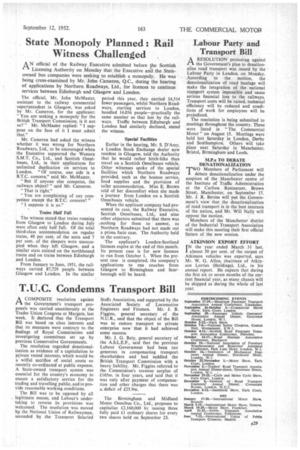State Monopoly Planned : Rail Witness Challenged
Page 31

If you've noticed an error in this article please click here to report it so we can fix it.
A N official of the Railway Executive admitted before the Scottish 1Th Licensing Authority on Monday that the Executive anil the Stateowned bus companies were seeking to establish a monopoly. He was being cross-examined by Mr. John Cameron, Q.C., during the hearing of applications by Northern Roadways, Ltd., for licences to continue services between Edinburgh and Glasgow and London.
The official, Mr. John McMaster, assistant to the railway commercial superintendent in Glasgow, was asked by Mr. Cameron, for the applicant: " You are seeking a monopoly for the British Transport Commission, is it not so? " Mr. McMaster replied: " I suppose on the face of it I must admit that."
Mr. Cameron had asked the witness whether it was wrong for Northern Roadways, Ltd., to be encouraged when the Executive supported the Western S.M.T. Co., Ltd., and Scottish Omnibuses, Ltd., in their applications for unlimited duplication on services to London. "Of course, one side is a B.T.C. concern," said Mr. McMaster.
"But if anyone else competes, the railways object?" said Mr. Cameron.
" That is right."
"You are complaining of any competitor except the B.T.C. concern?" " I suppose it is so."
Trains Half Full
The witness stated that trains running from Glasgow to London during July were often only half full. Of the total third-class accommodation on regular trains, 40 per cent. of the seats and 7 per cent. of the sleepers were unoccupied when they left Glasgow, and a similar state existed on the northbound trains and on trains between Edinburgh and London.
From January to June, 1951, the railways carried 87,729 people between Glasgow and London. In the similar period this year, they carried 14,514 feWer passengers, whilst Northern Roadways, starting services to London, handled 14,036 people—practically the same number as that lost by the railways. Traffic between Edinburgh and London had similarly declined, stated the witness.
Special Facilities Earlier in the hearing, Mr. S. D'Arcy, a London Stock Exchange dealer now resident in Glasgow, told the Authority that he would rather hitch-hike than travel on a Scottish Omnibuses vehicle. Other witnesses spoke of the special facilities which Northern Roadways provided, such as the hostess service, food supplies and the provision of toilet accommodation. Miss E. Brown told of her discomfort when she made a journey from London on a Scottish Omnibuses vehicle.
When the applicant company had presented its case, the Railway Executive, Scottish Omnibuses, Ltd., and nine other objectors submitted that there was .nothing for them to answer, as Northern Roadways had not made out a prima facie case. The Authority held to the contrary.
The applicant's London-Scotland licences expire at the end of this month. Its present case is for new licences to run from October 1. When the present case is completed, the company's applications to run coaches from Glasgow to Birmingham and Scarborough will be heard.




















































































